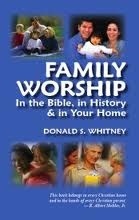Family Worship
October 19, 2011
FAMILY WORSHIP by Donald S. Whitney (CHAPTER 3)
ISBN:0978523806
“Read, Pray, & Sing” The Elements of Family Worship
Basically, there are three elements to family worship: read the Bible, pray, and sing. Only three syllables to remember-read, pray, sing. Jerry Marcellino, in his useful booklet, Recovering the Lost Treasure of Family Worship I uses three S’s as a reminder: Scripture, supplication, and song. But the elements are so simple that you probably will not need any reminders about what to do.
Read the Bible. Chapter-by-chapter, read through books of the Bible together. The younger the children, the more you will want to use narrative passages and shorter sections.’ As the children get older, set a goal of a complete reading of the New Testament, and later of the entire Bible. Read enthusiastically and interpretively. Explain words the children may not understand. Clarify the meaning of key verses. To improve their understanding, ask the children to explain a particular verse or phrase to you.
Pray. Whether prayer is offered by the father only, or by one he designates, or by the entire family, be sure to pray together. Some people keep a prayer list. Some simply ask for prayer requests from the family. Whatever your approach, pray about at least one thing suggested by the passage you have read. Many families go to the book of Psalms and turn the words of a few verses there into a prayer. If praying through the twenty-third Psalm, for instance, after reading the first verse you might thank the Lord for being your Shepherd, asking Him to shepherd your family through certain events or decisions before you, and so forth. As you have time, continue through the passage line-by-line, speaking to God about what comes to mind while reading the text. By so doing you will not only pray for your family (in fresh and unique ways), but also teach them by example how to pray.
Sing. Get hymnals for everyone. Your church may have some unused or older ones you could acquire. Your pastor or another worship leader at your church may be able to recommend other songbooks. The lyrics of many older, public domain (that is, not copyrighted) songs are available free on the Internet. Some people sing a different song each time; some sing the same song for a week so they can learn it. As to music, some families sing along with recordings, while others utilize family musicians, and many simply sing without accompaniment. Remember: with this and all other elements of family worship, some preparation is worthwhile, but not necessary. Just sit down and read, pray, and sing.
Spurgeon concurs, “I agree with Matthew Henry when he says, ‘They that pray in the family do well; they that pray and read the Scriptures do better; but
they that pray, and read,
and sing do best of all.
Some other helps in family worship
Catechize. Used for centuries by Christians in virtually all traditions, catechizing is a question-and-answer approach to teaching biblical doctrine. I have seen catechisms used successfully with children as young as two. For example, “Who made you?” is the first question asked in one catechism for very small children. Then the children are taught to answer, “God made me.” The questions are reviewed and new ones are learned incrementally so that over time the children absorb a tremendous amount of biblical truth. A good, age-appropriate catechism is as valuable for learning the Bible as memorizing multiplication tables is for learning mathematics. Ask your pastor for recommendations, or search for catechisms on the Internet.
Memorize Scripture. Family worship is a great time to review Scripture the family members have learned separately or collectively. Some families choose to work on one or more verses from the book of the Bible they are currently reading, others use different plans. Even learning just one verse per month is valuable and takes little time.
Read other books. If time allows, you might begin your gathering together with some general family reading, after which you enter family worship. Or, at the close of family worship, you might take advan- tage of the opportunity to read a Christian book or biography to your family.
Beyond these content-related guidelines, consider these three reminders for your family’s daily worship of God:
Brevity. Be brief. Otherwise the experience can become tedious. It is always easy to lengthen the time if the occasion seems to be especially meaningful.
Regularity. Try to have a regular time each day for family worship. For some people it works best early in the morning before the family scatters. For others, the most convenient time is at the close of the evening meal. If this is your choice, part of setting the table might include putting the Bible and songbooks close at hand. I would also recommend that you not allow anyone to get up from table until family worship is finished. For once someone says, “Just let me do this first,” the others can become impatient or think of things they also need to do, and the sense of family togetherness is lost. A third popular time for family worship is late in the evening or at bedtime.
Flexibility. Whatever time you choose, consider the wisdom of adapting a time when the family is already accustomed to being together, rather than trying to create another routine gathering during the day. Of course, a set time for family worship each day does not fit the schedule of many families. Every family has to flex its worship time sometime. Just make sure that your flexibility does not lead to inconsistency. Nevertheless, if developing an entirely new family routine is what it takes to begin family worship, the benefits will be worth whatever it costs.
Blessings,
Pastor Alvin
